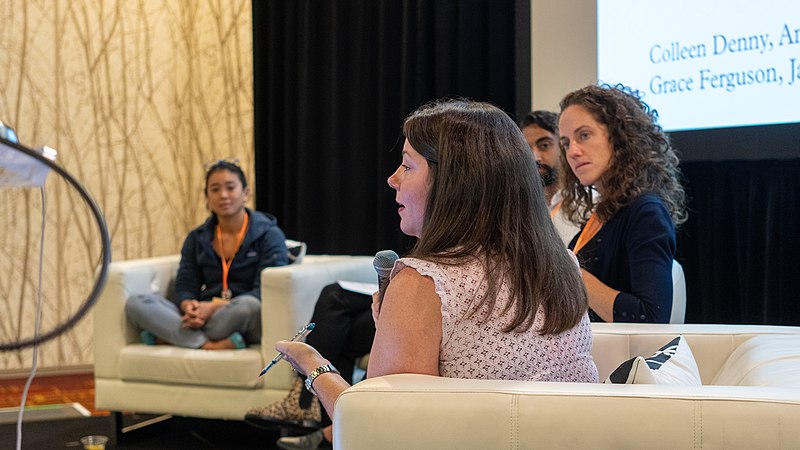“Our patients are using Wikipedia for their health questions, so the more health professionals we have editing, the better and safer information they get.”*
What would the world look like if everyone had unfettered access to knowledge? Free knowledge resources like Wikipedia provide an opportunity to put power into the hands of everyone. The Society of Family Planning (SFP) agrees, so they’ve sponsored Wikipedia training courses for their members to help improve the quality of abortion and contraception content on Wikipedia. Two cohorts of these in-depth trainings have now taken place (each spanning 12 weeks) and participating scholars have had great success bringing their expertise and professional experience into Wikipedia.
The training course
Wiki Education’s staff of Wikipedia experts facilitated online group sessions for participating SFP members, providing them with a space to ask questions, collaborate with each other, and receive hands-on support and technical training. Participants are now equipped with the Wikipedia know-how to contribute high-quality content to some of the site’s most-read pages about family planning.
Beyond the course
Director of Partnerships Jami Mathewson and Customer Success Manager Samantha Weald were thrilled to join many of these participating members, as well as SFP staff, at SFP’s annual meeting in October. Jami joined course participants Colleen Denny, Bhavik Kumar, Anne Davis, and Grace Ferguson on a panel about public scholarship through Wikipedia. The group responded to curious and enthusiastic attendees with overwhelmingly positive remarks about their experience in our course and the fulfillment they felt successfully adding to Wikipedia. The passion these scholars have for providing the public with up-to-date, accurate medical information was evident. Gaining knowledge and tools to more successfully contribute to Wikipedia is a great outcome of this course.

Successes
Among the many successes of this course, a few stand out.
Doulas play an important support role in many people’s health-related experiences, and the Wikipedia page about these professionals receives more than 1,000 views every day. The page was substantially expanded and improved by an SFP scholar, who rewrote the introduction and added multiple sections, including ones about training and certification. Previously, the page only referenced doulas in relation to childbirth. Now the new summary paragraphs reflect that doulas are involved in other capacities, as well, including with miscarriage, abortion, and end-of-life care. The SFP scholar is now responsible for more than half of the current entry.

Image by Senado Federal, CC BY 2.0 via Wikimedia Commons.
The page for vaginal bleeding saw impressive growth, with a scholar adding more than 2,500 words. They are responsible for half of this page, which is considered of “top importance” among Wikipedia pages related to women’s health. The section on vaginal bleeding in premenopausal women is dramatically expanded, with detailed and specific information conditions that can cause vaginal bleeding. 200 people consult this page every day.
The osmotic dilators page was a short stub with some outdated citations before an SFP scholar updated it and more than doubled its content. And because they have access to the tool in their professional work, the scholar even took some photos and uploaded them, as the page previously lacked any illustrations.
Tubal ligation, the surgical procedure commonly known as having one’s “tubes tied,” is one of the most popular forms of contraception. The page on tubal ligation receives more than 550 pageviews every day. It was significantly expanded and improved by a course participant, who is now responsible for 89% of the page. That participant shared why she thinks medical professionals should be involved in Wikipedia editing in one of our previous blog posts.
Menstrual suppression is the use of hormonal management to stop or reduce menstrual bleeding. Surprisingly, Wikipedia did not have a page about this topic before an SFP scholar created it.
The page about medical abortion (or medication abortion) describes the use of pills to bring about an abortion. It is another high-impact Wikipedia page, with 450 people checking it each day. A health professional in one of the SFP courses made a wide range of improvements, including reworking the introduction, expanding content, adding references, and replacing references with up-to-date research.
Another scholar improved the page on reproductive rights, with a focus on expanding the human rights section.
Given that most people who add content to the English Wikipedia live in the Global North, content about other countries is either underdeveloped or is told from an outsider’s perspective. One SFP scholar from Uganda went about telling the story of family planning in Uganda in their own words. Read more in our blog post.
The unintended pregnancy page has also been improved. The scholar who tackled it refined the definition, improved statistical information, added up-to-date references, and contributed content about other factors associated with unintended pregnancy.
An abortion fund is a non-profit that provides assistance to low-income women who cannot afford the costs of an abortion. The abortion fund page was expanded, many parts rewritten, and many sources added or replaced by an SFP scholar.
Other scholars fixed errors, updated statistics, expanded sections, or improved citations in the pages on emergency contraception, reproductive coercion, dilation and evacuation, late termination of pregnancy, mifepristone, and the main abortion page.
This project is sponsored by the Society of Family Planning (SFP) with the hard work of Amanda Dennis, Jenny O’Donnell, and other staff members. SFP has sponsored 32 seats since June 2019. Participation for accepted SFP members is free. If you’re interested in buying out a customized professional development course for members or staff of your organization or institution, contact Director of Partnerships Jami Mathewson at jami@wikiedu.org.
